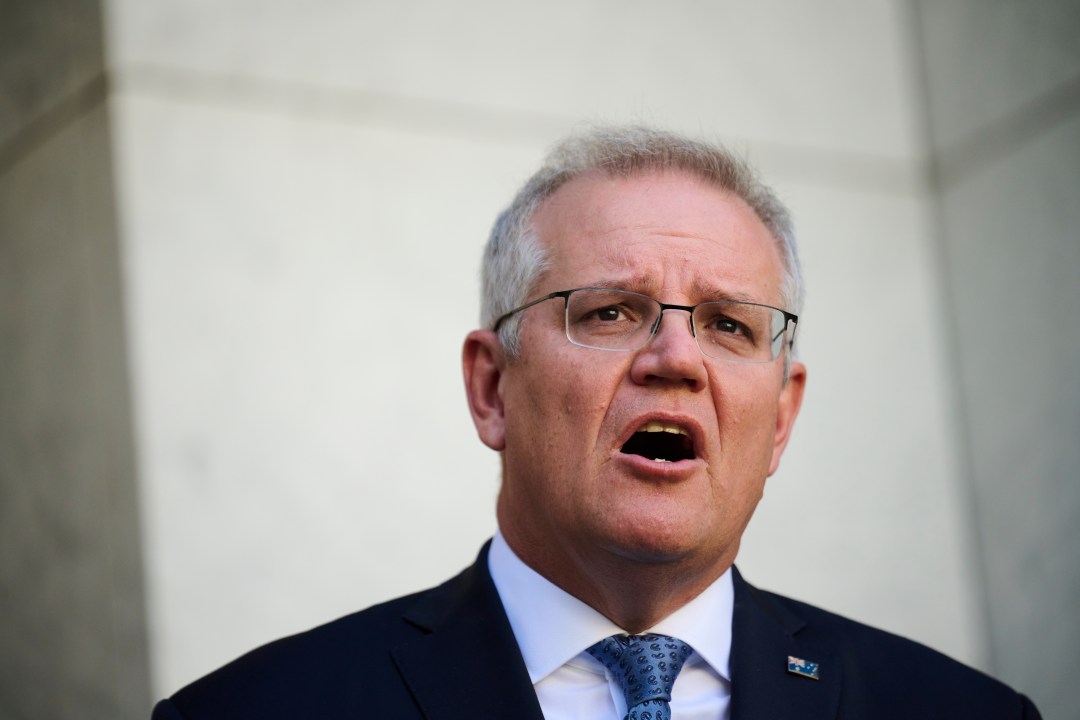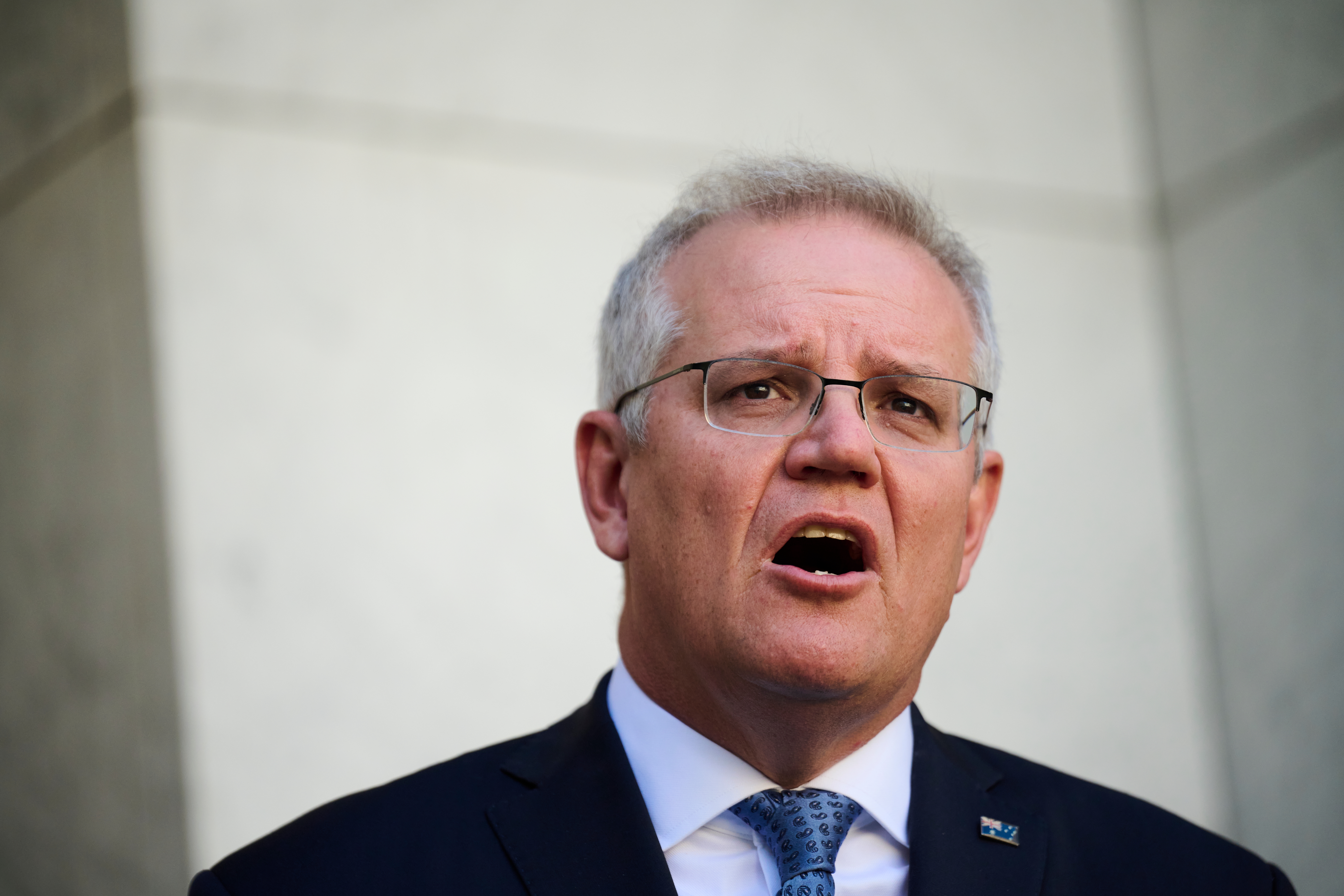At the end of last year, Australia was lauded for its success in containing Covid-19. The country’s borders had been quickly closed; interstate travel restricted and resources diverted to tracking down cases. In the deluge of praise that followed, outlets like the Washington Post ran gushing features on the country’s ‘pandemic success story’ ‘putting faith in science’; America’s top doctor Anthony Fauci hailed it as the ‘epitome of success.’
But eight months on and a different picture emerges. Covid has had an unfortunate habit of finding the weaknesses in a country or health system and in Australia the precious time gained last year was largely squandered on a widely-criticised vaccine roll out. Since then there have been a number of eerily familiar debates similar to those seen a year ago in the UK; outlandish statements on mask effectiveness, questions about AstraZeneca’s safety and uneasy authoritarian stances.
Below is Steerpike’s guide to five moments of madness in Australia’s battle with Covid-19.
Vaccine roll out
In a country with relatively high vaccine hesitancy, the actions of public health officials have greatly undermined faith in the AstraZeneca vaccine. Australia’s vaccine strategy was originally based on its large stocks of the AZ jab, but many Australians adopted a ‘waiting for Pfizer’ policy amid mixed government messages regarding blood clot risk and comments from the federal health minister in May promising mRNA vaccines later in the year.
Despite its success in Europe, the government initially recommended the AstraZeneca shot only in people over 60, prompting a wave of cancellations. Then as cases surged it advised all adults ‘who do not have immediate access to the Pfizer vaccine’ to have AstraZeneca instead. Just days after the federal government opened up AstraZeneca for younger Australians, Queensland’s chief medical officer warned of its risks, claiming ‘Wouldn’t it be terrible if our first 18-year-old in Queensland who dies related to this pandemic, died because of the vaccine?’
Not for nothing did Clive James joke: ‘The problem with Australians is not that so many of them are descended from convicts, but that so many of them are descended from prison officers.’
Such confusion has resulted in scenes such as just 50 people turning up to a mass vaccination centre for AstraZeneca last month – the same day 9,000 got Pfizer. The vaccine take up has since improved but less than 24 per cent are still ‘fully vaccinated.’ Under-fire Prime Minister Scott Morrison has said that only when coverage hits 80 per cent will vaccinated Australians would be free to travel interstate.
Masks and outdoor transmission
There has been similar confusion over whether face masks should be worn. While much of Europe – including the UK – had debated masks for months and introduced them in spring/summer 2020, Australia did not resolve the issue for another year. Health advice was not in fact updated until June and July 2021 after levels of levels of untraced community transmission went up. But despite this belated focus on indoor settings, some public health messengers do not seem to appreciate the greatly-reduced risks of contracting Covid outside.
Victoria Premier Daniel Andrews went viral online this month after suggesting you could not remove a mask to drink outside, saying: ‘There will be no removal of masks to consume alcohol outdoors, you will no longer be able to remove your mask to drink a cocktail at a pop-up beer garden on a footpath as part of a pub crawl.’ Another missed chance to learn from Europe’s mistakes and explain outdoor transmissions versus inside.
Even worse was Dr Kerry Chant, the New South Wales Chief Health Officer, who implied that Australians should not to talk to one another outside. She said at a press conference: ‘We need to limit our movements. We need to consider whenever we leave our house that anyone with us, anyone we come into contact with, could convey the virus. So, while it is in human nature to engage in conversation with others, to be friendly, unfortunately, this is not the time to do that.’
Treatment of expats
Thousands of Australians remain stranded abroad, unable to come home because of its government limits on daily arrivals. The country already has a weekly limit on incoming travellers and bans foreigners from entry unless they have an exemption. Its policies are among the strictest globally and last month, it halved the number of permitted arrivals due to Delta variant outbreaks. During the previous wave in India, citizens attempting to return home from that country were threatened with hefty fines and imprisonment of up to five years.
Two weeks ago the government quietly expanded its ban on Australians leaving the country, in place since March 2020. Previous exemptions for visiting Australians who live overseas – including emergencies – have been tightened, amid fears that citizens will miss saying farewell to elderly relatives. Constitutional law experts told the Guardian the new changes could be unconstitutional and make Australia’s tough border policy ‘even more draconian’ with one academic warning: ‘If you land here, you could be trapped.’
Compounding this are the special arrangements regularly approved for celebrities and billionaires to fly in and quarantine at home or in five-star resorts. Oscar-winning actress Nicole Kidman; her husband-singer Keith Urban and singer Dannii Minogue–Kylie’s sister – were among those prominent figures allowed to home quarantine, rather than spend 14 days in hotel detention.
Covid enforcement
Not for nothing did Clive James joke: ‘The problem with Australians is not that so many of them are descended from convicts, but that so many of them are descended from prison officers.’ The country’s authoritarian Covid response has caused much alarm within the country about the heavy-handed way in which it has been enforced. As Australian academic Ramesh Thakur has noted such incidents have included the following:
The authoritarian streak has seen various instances of what some people would call inhumane treatment. At a time of zero active cases in Canberra, a woman was denied permission to fly to Queensland to see her dying father. A mother from across the border in New South Wales lost her baby last year after being unable to get timely treatment in Brisbane because of the time it would have taken to fill out the paperwork to cross the state line and enter the hospital to receive emergency care. A grandmother was also recently denied a permit to go to Melbourne to help care for her grandchildren while her daughter battles advanced breast cancer. And in a country town in February, a pregnant woman posting on Facebook to support a peaceful protest against Victoria’s lockdown was handcuffed and arrested in her house in the early morning hours, still in her pajamas.
Dog murders
One story which has encapsulated the most illiberal and illogical aspects of Australia’s response was yesterday’s news that a rural council in New South Wales ordered the execution of several impounded dogs to prevent volunteers from picking them up. Under its interpretation of COVID-19 restrictions. Bourke Shire Council, in the state’s north-west, killed several dogs to prevent volunteers at a Cobar-based animal shelter from travelling to collect the animals last week. The revelation has, unsurprisingly, triggered shock and fury around the world.
Steerpike wishes his Antipodean friends Down Under better luck in their Covid struggles in future.








Comments